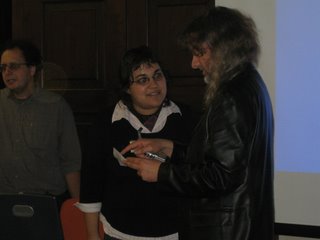Explaining what?
I have almost finished the final version of my paper "Can phenomenal concepts explain the explanatory gap?". As I have said before, it is a reply to Chalmers' "Phenomenal Concepts and the Explanatory Gap", which poses a big dilemma for the phenomenal concept strategy. In my paper I try to find a way out of the dilemma.
The PC strategy aims to offer an alternative explanation of the explanatory gap in terms of the features of phenomenal concepts. A key issue is how to characterize the explanatory/ epistemic gap to be explained. Chalmers says that what has to be explained is our epistemic situation with regards to consciousness. But this seems too much: what poses the problem for physicalism is the fact that we can conceive of zombies, or more in general, P&~Q (where P is a physical description and Q is a phenomenal description of the world). So, what the PC strategy aims to explain is precisely this conceivability.
However, Chalmers insists that we should understand the epistemic gap between P and Q as involving beliefs about Q that are true and justified. Why? Well, the answer seems to be that the conceivability argument against physicalism requires Q to be true, because only then can the possibility of P&~Q be a problem for physicalism. But, why does this entail that the epistemic gap involves the truth and justification of our beliefs about Q? I don't see why.
Chalmers said (in response to my talk in Milan) that he understands the epistemic gap to be explained, in a topic-neutral way, that is, it does not involve phenomenal states. However, it does seem to involve phenomenal knowledge. There are different options here. One could say that if you characterise this "phenomenal" knowledge topic-neutrally, even a zombie could have that kind of knowledge. Another option is to say that that notion of phenomenal knowledge involves phenomenal states, by definition, otherwise it would not be phenomenal knowledge. What Chalmers wants is a third option: phenomenal knowledge is characterised topic-neutrally but zombies cannot have it, because they are not conscious. I tend to believe this is not plausible.
To sum up, there are two problems with Chalmers' argument. 1) It is not clear why the epistemic gap involves the truth and justification of Q, in addition to the inferential disconnection between P and Q. And 2), it is not clear that Chalmers can have the cake and eat it: he needs a notion of "phenomenal" knowledge that is topic-neutral but that zombies cannot have, but this seems dubious.

